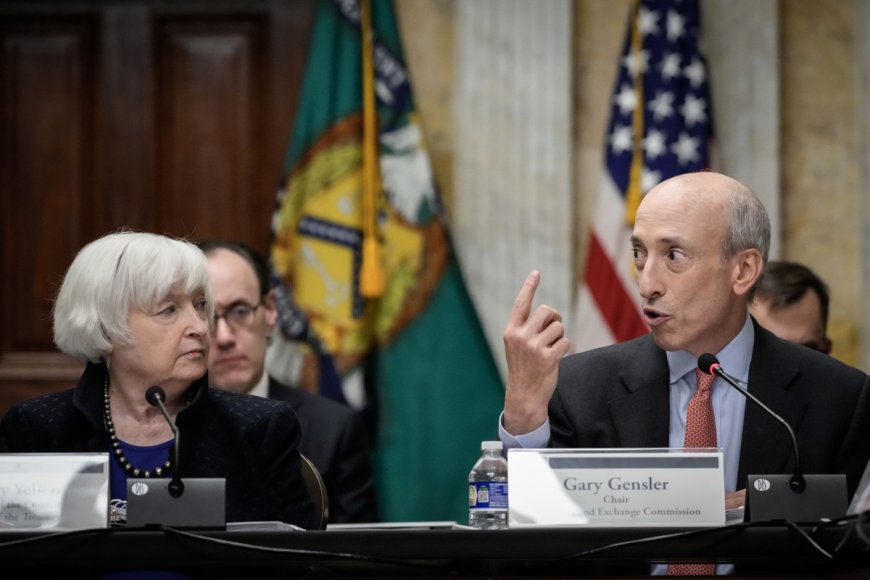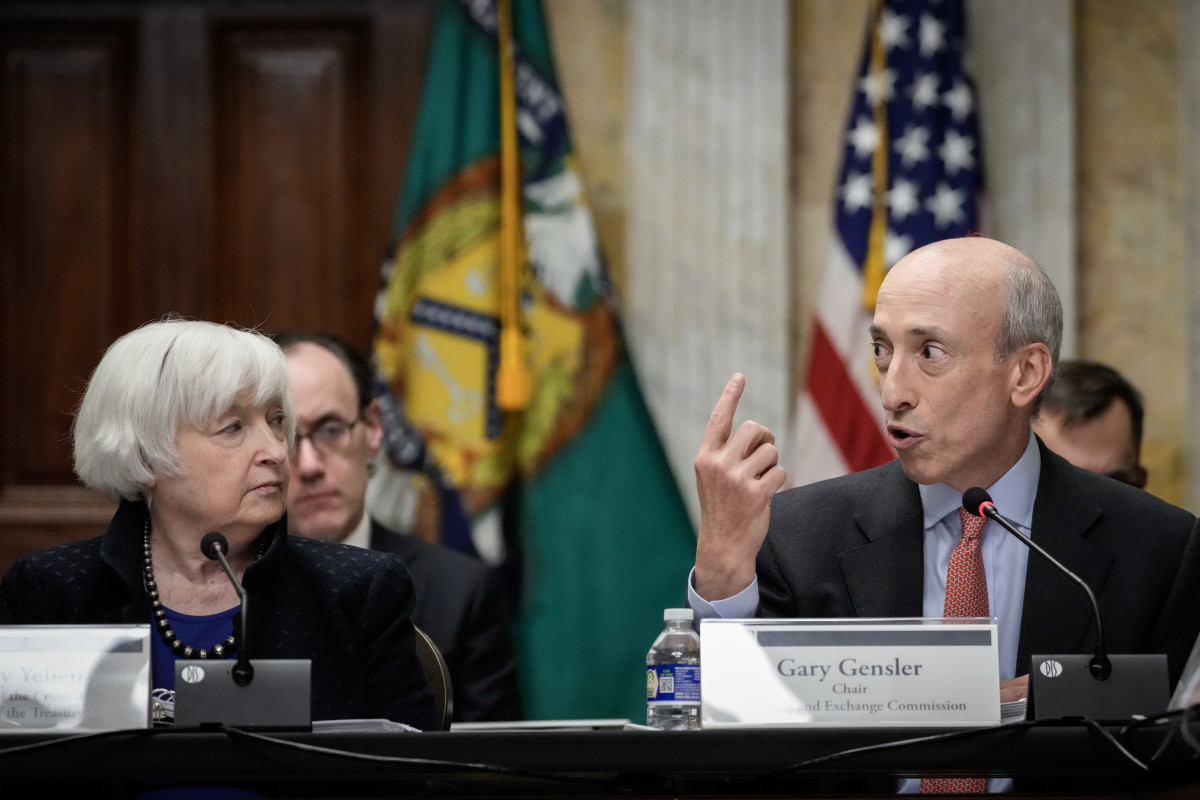What did 2 days of trading in Bitcoin ETFs show?
Nine newly-approved ETFs started trading last week after SEC approval. Volume was high.

Wall Street and bitcoin got their collective wish this past week. The Securities & Exchange Commission finally approved the first exchange-traded funds that invest in bitcoin.
And in two days of trading on Jan. 11 and Jan. 12, the volume was pretty intense.
Related: Bitcoin ETF approval opens $1.7 trillion crypto door for Wall Street
Bitcoin itself had a fairly volatile week, starting at about $44,000, rising to as much as $48,992 and then dropping back to a Sunday close of $42,562. (Bitcoin is traded 24/7.)
It's been up as much as 10.8% this month, but, with the Sunday close to $42,562, the January gain had been whittled down to 0.12%.
With the new ETFs, a lot of investors seemed poised to sell quickly.
A new shiny toy for investors
A new investment vehicle often grabs a lot of attention and money, but the interest tends to fade after a bit. Many financial advisors often tell clients to be patient about a new offering and let the market settle out. It's a polite way of saying: "Wait for the price to fall."
A bitcoin ETF that invests in actual bitcoin has additional baggage. The price has been volatile almost from the start. There's skepticism about who actually needs it. 
And the SEC itself was divided about approving the ETF applications. In a statement, Chairman Gary Gensler noted only that the SEC had approved the application but did not endorse them, then added, "Investors should remain cautious about the myriad risks associated with bitcoin and products whose value is tied to crypto."
There was, in fact, enormous interest in the ETFs that hit the market last week. So, a pullback on high volume is not out of the ordinary.
Related: Analyst predicts Qualcomm stock rally, unveils new price target
The iShares Bitcoin Trust (ticker: IBIT), for example, saw volume hit nearly 60 million shares Thursday, Jan. 11 and Friday, Jan. 12. The ETF opened at $27.94 on Thursday, jumped to $30, then fell to a close of $26.63. On Friday, it opened at $26.40, topped out at $26.41, then slumped to $24.75 before closing at $24.97.
The ETF is sponsored by BlackRock (BLK) - Get Free Report, the giant money manager.
The decline over two days was 10.6%. The change is based on the opening price when trading began on Thursday.
The iShares Bitcoin's performance wasn't the worst of what are called spot ETFs. A spot ETF means its sponsor holds actual bitcoin and isn't trading futures on the crypto currency.
More markets stories:
- Can Big Tech just drag the stock market along?
- Analyst predicts Qualcomm stock rally, unveils new price target
- JPMorgan CEO Jamie Dimon warns not to get too smug about a ‘soft landing’
The worst performer over the two days was the ARK 21Shares Bitcoin ETF (ticker: ARKB), down 12.3%. The ETF is sponsored by Ark Investments, the asset management firm operated by Cathie Wood.
Ark's overall objective is to invest in companies engaged in disruption, innovation and related ideas. Wood has been a highly visible, enthusiastic supporter of cryptocurrencies and probably wasn't much bothered by her ETFs returns.
The results of eight other new spot ETFs over the two days:
- Bitwise Bitcoin ETF Trust: (Ticker: BITB) down 10.60%.
- Fidelity Wise Origin Bitcoin Fund: (Ticker: FBTC) down 8.67%.
- Franklin Templeton Digital Holdings Trust: (Ticker: EZBC) down 11.83%.
- Grayscale Bitcoin Trust: (Ticker: GBTC) up 3.82%.
- Invesco Galaxy Bitcoin ETF: (Ticker: BTCO) down 8.87%.
- Valkyrie Bitcoin Fund: (Ticker: BRRR) down 11.56%.
- VanEck Bitcoin Trust: (Ticker: HODL) down 10.11%.
- WisdomTree Bitcoin Fund: (Ticker: BTCW) down 8.91%.
Again, the price changes are based on the opening price in Thursday's trading.
The last of the approved ETFs was held up with getting final paperwork to convert the fund from investing in bitcoin futures to investing in spot bitcoin directly. The final okay for the Hadesh Bitcoin ETF, managed by Brazilian company Hadesh, may not come until the second quarter. It will trade under the ticker DEFI.
The ETFs are being traded on three exchanges.
- NYSE Arca Platform will trade the Grayscale Bitcoin Trust, the Bitwise Bitcoin ETF and the Hashdex Bitcoin ETF when its new filings are approved.
- The Cboe BZX trade shares of the ARK
- The Nasdaq will list and trade shares of the iShares Bitcoin Trust and the Valkyrie Bitcoin Fund.
Grayscale is the oldest company with bitcoin ETFs, launched in 2013. It is the world's largest holder of bitcoin and one of the largest holdings of Ark Investments.
Bitcoin's wild ups and downs
Ark Investments' Cathy Wood is a permabull on the topic. She once predicted the value of a single bitcoin could reach $400,000 to $500,000 by 2030. Lately, she's said it could top $1.5 million by 2030.
And she's had great results and not-so-great results.
Bitcoin was up 157% in 2023.
It was up as much as 134% in 2021, peaking at $68,925. Then, the Federal Reserve announced it would raise interest rates to fight inflation. Bitcoin's gain shrank to only 59% by year-end 2021 and fell 64% in 2022. (Bitcoin is still down 38% from that 2021 peak.)
Bitcoin is not really a currency because most players interested in it appear to use it as a trading vehicle. Its moves often track those of the Nasdaq-100 Index (^NDX) - Get Free Report.
And, of course, it has intense critics, including the current SEC chairman.
One of the loudest critics is Jamie Dimon, the CEO of megabank JPMorgan Chase (JPM) - Get Free Report. "The only true use case for it is criminals, drug traffickers … money laundering, tax avoidance,” he thundered in a December hearing of the U.S. Senate Banking Committee.
What's Your Reaction?

























































